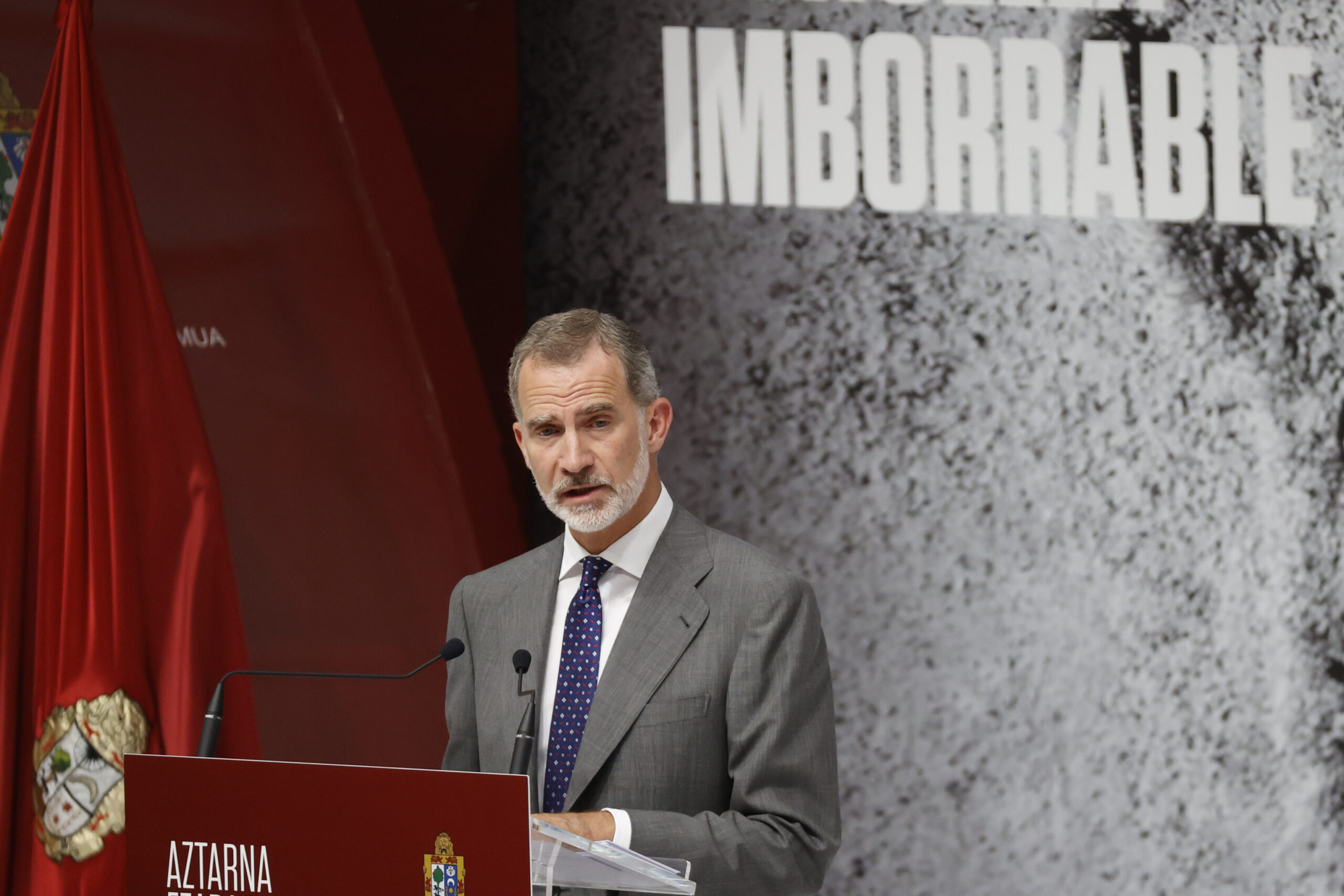Felipe VI has asked this Sunday, on the 25th anniversary of the kidnapping and murder of Miguel Ángel Blanco, that the spirit of Ermua not fall into oblivion. “We cannot allow that there are generations that ignore what happened in those painful days of our history; that do not know how and why it united our collective conscience; that ignore something that also contributed to establishing our coexistence or the massive movement that took place in Spain after a murder that marked our democratic life so much,” he said.
In an act held at the sports center of the Biscayan town, which bears the name of the popular mayor assassinated by ETA, Felipe VI gave an emotional speech in which he recalled that on July 14, 1997, the day after Blanco’s death , traveled to Ermua. He was then a Prince and was 29 years old, the same age as the murdered man. Those were “impossible to forget” days. “We were all with his family; we all feel like the same family,” said the King.
“Let’s continue to persevere”, he added as a closing, “so that what we have experienced does not fall into oblivion; so that unity summons us around our recent history; so that the spirit of Ermua reminds us, every day, of the value of peace, life, freedom and democracy”. As at his arrival in Ermua, cries of “long live the King” have accompanied the end of his intervention.
His words were heard in the front row by the President of the Government, Pedro Sánchez, the Lehendakari, Iñigo Urkullu, and the President of the PP, Alberto Núñez Feijóo, the first three to be greeted by Felipe VI upon arrival at the event. Before its start, the King spoke for a moment with Marimar Blanco, sister of the murdered man.
The victims, like the councilor and his family, have been very present in the words of Felipe VI. “The victims of terrorism dignify our democracy. Their pain and that of their families matters to us and concerns us. That is why they permanently deserve our respect and our utmost consideration.”
Half a dozen times, included in the final sentence, Felipe VI has expressly referred to the spirit of Ermua, which he has described as “the victory of the collective conscience” of the entire town. “It is the victory of dignity and morality over fear and terror.”
After a few words from Ana Aizpiri, a victim of terrorism, and the mayor of Ermua, the socialist Juan Carlos Abascal, Marimar Blanco spoke, whose intervention in the act was not planned until she herself publicly requested it a few days ago.
“Up Marimar!”, shouted one of the attendees just when he was about to take the floor. An intervention in which he wanted to highlight and accentuate the “constant support” that the Royal House has “always” provided to the victims, “receiving affection, closeness and respect”.
The councilor’s sister has asked on several occasions not to forget what happened then, what happened under ETA terrorism. “There is no reason that justifies a favorable treatment to those who those days applauded the ordeal to which my brother, my family and the vast majority of Spaniards were subjected.”
Before the President of the Government, Marimar Blanco explained the need for “the truth of what has happened to be respected without perversions or intoxications, making it clear that some killed miserably and cowardly and others died. That democratic memory recognize terrorism like a fight between good guys and bad guys, with victims and executioners”.
Some reflections expressed in the midst of controversy over the approval of the new Democratic Memory Law thanks to a pact between the Government and EH Bildu, “who designate themselves heirs without duly condemning the crimes”, in the words of Marimar Blanco.
And without expressly mentioning it, he has sent a clear message to Sánchez: “Justice and truth should always be the priority of the Government for the victims and for the quality of democracy. The opposite is neither fair nor decent.”
The “memory”, the recollection of episodes like that of Blanco and of the years of terrorism in general, has also been present in the words of Urkullu, the next to intervene. We should not and do not want to wipe the slate clean as if nothing had happened”, the Lehendakari stated.
Urkullu began by affirming that ETA’s violence “was ethically, politically and democratically unjust” and he called for “sincere self-criticism from those who supported terrorist violence”.
Between the Lehendakari and the King, the President of the Government intervened, starting off by saying that with Blanco’s death, “something changed forever”. Sánchez stated that “ETA did not achieve any of its objectives” and that “those hopes for peace in 1997 have finally, finally, become a reality”. “Today the Basque Country and Spain are free and peaceful countries,” he said.
He has also referred to the memory of terrorism, after recalling that the new generations have not experienced the terror of ETA. “We have to keep telling this story, we have to keep it alive. We need society not to forget. Keep the memory of Michelangelo and all the victims of terrorism.” His government does it, he has argued, mentioning a government program to bring the story of the victims to high school students.
Conforms to The Trust Project criteria
















